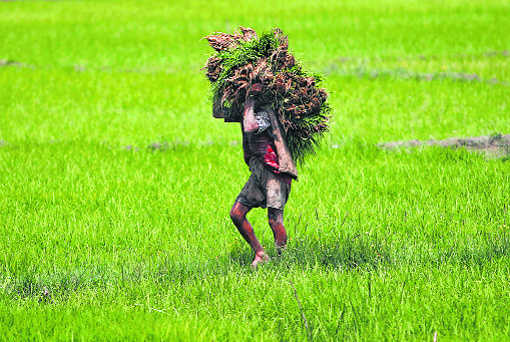
Band aid: Loan waiver is not the way out to tackle farm distress.
Rajesh Ramachandran
For once, a national election is going to be contested on issues of farm distress. Ram of Uttar Pradesh and Ayappan of Kerala can take a backseat, the driver this time around is the farmer. Every party will be forced to come up with a solution or at least a band aid for the bleeding wounds of our villages. Sure, the Congress has struck the bull’s eye, offering the easiest solution: announce a farm loan waiver. Everybody takes loans and when farmers take them they get to be called farm loans. The meagre loans from the banks or institutions may not suffice to fund a wedding, a motorbike, a student’s payment seat in a self-financing college or a pucca house, and then the new crop, leading villagers to the moneylenders’ trap. When an average Indian debtor’s (not to be confused with those in the United Kingdom of fugitives) pride gets hurt beyond repair, he often finds solace in rat poison. The farm crisis continues and so do suicides.
Fortunately, the recent Assembly polls, particularly the one in Madhya Pradesh, have brought this crisis to the fore, forcing the challenger Congress to promise a way out. It worked and the party is implementing its farm loan-waiver schemes in the three states it won last month. The BJP, on the other hand, has been trying hard to claim that loan waivers won’t work. When proud people are reduced to beggars, alms are what they look for and they may actually make a lot of difference. Sure, they will take more loans and they will again get into a debt trap. Then they would need more loan waivers, if that is the only way the cycle of misery is going to be managed.
Or else, there is a tougher, but better solution: remunerative prices. Treat the farm sector like any other sector in the economy and make it profitable. But in the name of the farmers, the governments have always been trying to accommodate so many vested interests that the farmer never gets the price he deserves. The latest example is from Haryana. The government had a splendid initiative to register all crops online. The idea was to stop scamsters from buying PDS foodgrain from the black market in Uttar Pradesh or Bihar, bring it to Haryana and sell it to the government and pocket the MSP, all in the name of the farmer. The scam was at various levels and at every level the victim was the poorest of the poor, starting with the PDS beneficiary.
The Haryana Government’s scheme was path-breaking, particularly the aspect about direct transfer of the price of the produce to the farmer's account. Unfortunately, the government could not withstand the pressure of the middlemen’s lobby. It rolled back the scheme. Now, the middlemen will continue to play a role in the buying and selling of the produce, where the buyer is the government and seller is the farmer. If wheat and paddy are bought directly from the farmer and the rest of the transaction, like milling, is done between the government and the millers, profiteering in the name of farmers would not happen. But unfortunately, in the name of the farmer, far removed from the goings-on, the government is forced to let a PDS scam thrive under its nose.
Worse is the situation in the case of sugarcane farmers. They lug their produce and wait outside the sugar mills, bribing petty officials for the gate pass, to sell their produce. And then, wait for their cane dues. Some of it might come in six months, some after a year or even later. Then they have to block the highway and the rail lines. Yet, millers owe Punjab farmers over Rs 700 crore and Haryana farmers about Rs 300 crore in cane dues. The irony is that the consumer queues up to pay the MRP for his sugar and the third-rate alcohol before leaving the shop counter. What if the consumer tells the miller that she would pay for the sugar and the alcohol after six months or after she gets a subsidy from the government? This irony has not sunk into the minds of our rulers.
Why can’t it be the other way around? Why can't the millers go around, collect the harvest, pay at the farm gate and then make the sugar and the alcohol? Or else, why can’t the government procure and pay the farmer directly and deal with the millers separately? This is the paradigm shift the farm sector is waiting for. If foodgrain and sugar are highly regulated industries, the less said the better about vegetables. A glut in the potato crop, as it happened this year, would only mean the erosion of the hopes and savings of the farmer, who has to throw his produce to the buffaloes because it costs more to take it to the market than to let it simply rot in the backyard. All he needed was probably a little technology to distil vodka out of it. Then, the government’s attempt is only to make the vodka manufacturer or the importer wealthy, not to help the potato farmer make a living.
The primary producer and consumer of farm products are definitely not at the centre of our policy-making efforts. The policy-drivers are the traders when it comes to foodgrain, millers for sugar, wholesalers and retailers for vegetables, and liquor barons for alcohol. The farmer and the consumer have neither say nor role, but to be in perpetual debt. The government should stop looking at alcohol just as a means of taxation and let the farmer add value to his produce, distil his own drink and sell it in the neighbourhood, creating a new revenue stream in our villages. But for that we need visionary politicians who can think bigger than cow and cow dung.



























